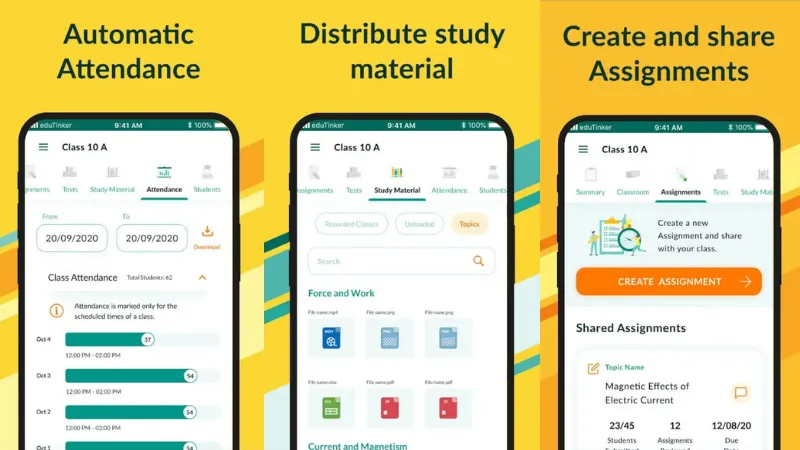This edtech startup brings physical classrooms online, plans to onboard 500,000 students in 2021
eduTinker is one of the many edtech startups born during the pandemic. The B2B platform is helping schools in India and Nepal transition from offline to online.
It’s a new year, but the ripple effects of the pandemic are still being felt across industries.
Edtech continues to boom as schools and academic institutions remain shut across the globe. Edtech entrepreneurs believe there’s a huge untapped market to serve, and multiple players can co-exist.
Following the pandemic-led boom — edtech funding grew from $522 million in 2019 to $2.2 billion in 2020, as per the Indian Private Equity and Venture Capital Association (IVCA) — a plethora of edtech startups have mushroomed to cater to the emerging needs of the ‘new normal’.
eduTinker is one such startup that was born in the lockdown.
Founded by Singapore-based serial entrepreneur Akash Aggarwal and techie Nilesh Gupta, the startup has built a one-stop student management platform for schools, coaching centres, and private tutors, and is expediting their movement from offline to online.

Akash Aggarwal, Founder and CEO, eduTinker
The genesis of eduTinker lay in the founders’ interactions with teachers in India, the US, and Southeast Asia (SEA). That validated its problem statement.
Founder and CEO Akash tells YourStory,
“Teachers were using different platforms for different activities and classes. Assignments were being shared on email, communication was on WhatsApp, and video classes were being held on some other platform. It involved a lot of manual work. So, we built a unified platform that can organise and automate all these activities under a single dashboard, and boost productivity of teachers and students.”
Singapore-based eduTinker, which also has an office in Delhi, began operations in July, and launched its product in November.
Bringing physical classrooms online
eduTinker blends a learning management system (LMS) with an enterprise resource planning (ERP) solution for schools. The platform automates physical classroom activities to drive efficiency in remote learning.
Teachers can schedule live classes, upload recorded classes, auto-mark attendance, create daily timetables, distribute and evaluate assignments, grade online tests, give voice feedback, share study material, track performance, boost classroom interaction using features like collaborative whiteboards, and communicate with students and parents in real time.
Live classes typically have a 1:20 to 1:40 teacher-student ratio. Each class goes on for about 40 minutes to an hour. Schools can also automate collection of fees, make key announcements, and send updates and notifications on each student activity via the platform.

Infographic: YourStory
The founder explains, “eduTinker is a global product at local rates. Our analytics dashboard offers a 360-degree view of student activity to the school, principal, subject-wise teachers, tutors, and parents. It gives insights on each student’s performance that can help you monitor and understand areas that need improvement.”
“Many platforms restrict the study material that can be shared, but we allow video, audio, links, PDFs, docs, and all forms of multimedia,” he adds.
Essentially, eduTinker improves visibility in the learning process, increases productivity of all parties, and eliminates the need for additional infrastructure, thereby enabling scale, reach, and consistency in learning.
The app provides independent log-ins to teachers and students. It has crossed over a 1,000 downloads on Google Play Store in two months.

eduTinker app has crossed 1,000 downloads in two months
Business model and growth plans
eduTinker, which is currently bootstrapped, operates on a hybrid model: B2B for schools and B2C for private tutors. The app is free for the latter.
The startup claims that classes on its platform are growing steadily week on week. It plans to onboard 500,000 students by 2021-end.
Several schools in India have been onboarded, while discussions are on with a few others in Nepal — a market showing significant demand. “India is our focus market, but we also plan to expand to Nepal, Singapore, and other parts of SEA,” Akash reveals.
eduTinker competes with the likes of , mPowerO, , , Google Classroom, , and others in the LMS segment. The global LMS market is poised to double in size from $13.4 billion in 2020 to $25.7 billion by 2025, riding on behavioural shifts induced by the pandemic.

Global LMS market is poised to reach $25.7 billion by 2025
Despite the increasing competition, Akash believes that eduTinker’s user-friendly features and cost competitiveness will help it stand out. “We also provide teacher training. Many big players don’t focus on that,” he says.
He further explains,
“In developed countries, most schools are connected through LMS. But in India, teachers weren’t ready to adopt remote learning. Thanks to COVID-19, everyone now realises that they have to be prepared for such black swan events. Hence, LMS adoption will grow.”
India has about 1.5 million schools, but only about 20,000 of them use ERP today. Hence, eduTinker is staring at a huge untapped market.
The startup is “good to go” for 18 months before it raises external capital. However, investor interest is aplenty.
“About 15 VCs from India, the US, Europe, and SEA have already reached out to us, but we want to acquire customers before raising a seed round,” Akash says. “We know that we don’t need just money; we need smart money,” he adds.
Edited by Teja Lele










